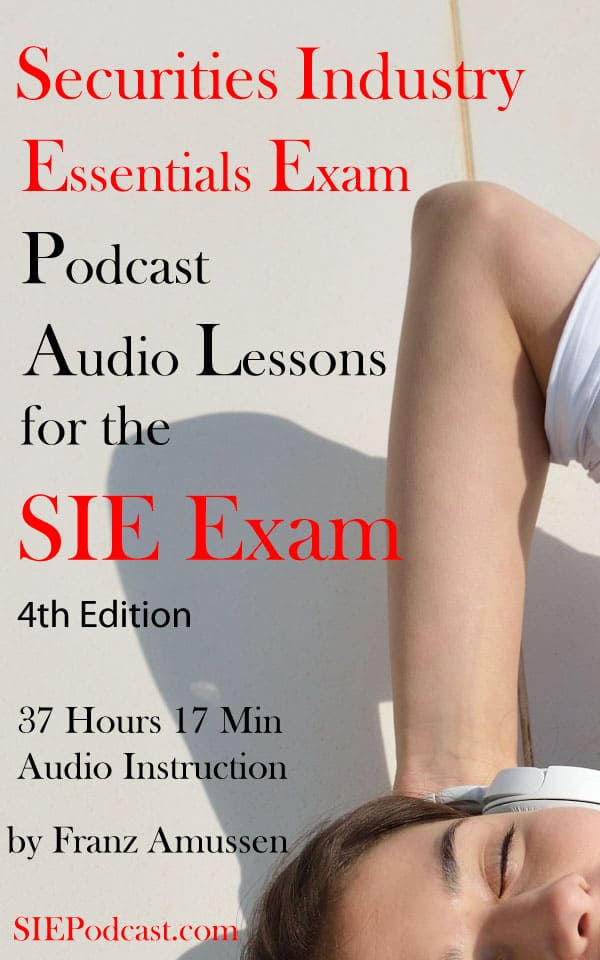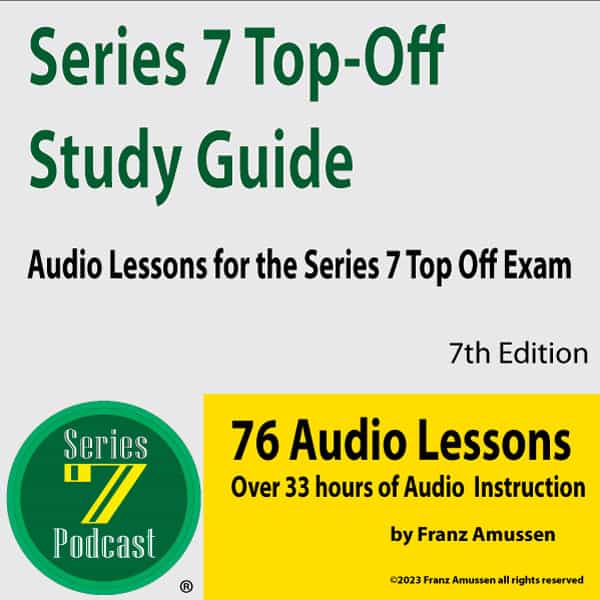Podcast: Play in new window | Download (Duration: 12:45 — 5.2MB)
Series 7 Top-Off Exam Quiz Lesson 46 Unit Investment Trusts
This is Series 7 Top-Off Exam Quiz Lesson 46 Unit Investment Trusts
1. It is a specific portfolio of bonds that is self-liquidating.
A. unit investment trust
B. open-end mutual fund
C. closed-end mutual fund
D. hedge fund
2. The unit investment trust is regulated by the Investment Company Act of 1940.
A. True
B. False
3. What is the implication of a unit investment trust being self-liquidating?
A. The investor will get back over time the principal plus interest.
B. The net asset value of the trust is independent from the market value.
C. The trust is free from ownership risk.
D. There is a constant interest rate until the trust’s maturity.
4. Which of the following is true about a unit investment trust which invests in fixed income investments?
(Select all that apply.)
A. Buying the trust is buying shares of beneficial interest.
B. Holding the unit investment trust to its maturity returns the investment (assuming no defaults).
C. If the trust is sold prior to maturity, it has more interest rate risk than other fixed income portfolio.
D. Unlike a bond, this trust is a fixed portfolio.
5. A fixed income unit investment trust differs from an open-end mutual fund in such a way that ___.
(Select all that apply.)
A. A fixed income unit investment trust is self-liquidating; an open-end mutual fund is not.
B. An open-end mutual fund has breakpoints; a fixed income unit investment trust has none.
C. An open-end mutual fund is perpetual; a fixed income unit investment trust is not.
D. An open-end mutual fund pays a little, if any, management fee; a fixed income unit investment trust pays very high management fees.
6. A unit investment trust does not expand nor contract in size once issued.
A. True
B. False
7. Unit investment trusts can invest in ___.
(Select all that apply.)
A. closed-end funds
B. corporate bonds
C. government securities
D. equities
8. The shares of beneficial interest in a unit investment trust can be redeemed prior to maturity.
A. True
B. False
9. A unit investment trust that invests in a master limited partnership will receive a ___ at the end of the year.
A. 1099-DIV
B. 1601F
C. CF-213
D. K-1
10. A trust invests in a closed-end fund. The fund’s net asset value is $28.74. It currently trades at $29.03. What is the percentage of the premium?
A. 0.01%
B. 0.09%
C. 0.99%
D. 1%
11. It is a unit investment trust used to fund variable annuities.
A. fixed income unit investment trust
B. municipal bond unit investment trust
C. participating unit investment trust
D. stock unit investment trust
12. In a fixed income unit investment trust, if any of the bonds in the fund default, the principal that the investor would be getting back would ___.
A. increase
B. decrease
C. remain the same
D. be equal to the market value
13. A unit investment trust that invests in US government bonds that is held in maturity is NOT subject to ___.
A. credit worthiness risk
B. currency risk
C. interest rate risk
D. principal risk
14. What is the advantage of buying a unit investment trust that strictly invests in a master limited partnership (compared with a unit investment trust that invests in closed-end funds that invest in the same master limited partnership)?
(Select all that apply.)
A. It avoids paying several management fees.
B. It can generate more income because the management fees are lower.
C. It has lower interest rate risk.
D. It receives the simpler 1099-DIV at the end of the year.
15. These are risk-free investments.
A. direct government securities
B. closed-end funds
C. unit investment trusts
D. treasury bonds
16. When a unit investment trust closes, the investor can ___.
(Select all that apply.)
A. get the proportion of the securities held in the trust
B. roll it over into the next unit investment trust
C. sell the shares
D. take a liquidation
17. Rolling over into the next unit investment trust is a non-taxable event.
A. True
B. False
18. It is taking the proportion of the securities held in the trust when the unit investment trust closes.
A. calling off
B. in-kind distribution
C. liquidation
D. rolling over
19. The intention to receive in-kind distribution when the unit investment trust closes must be made known to the trust at least ___ days before the termination of the trust.
A. 7
B. 15
C. 30
D. 60
20. A large enough position is required before an investor can opt to receive in-kind distribution when the unit investment trust closes.
A. True
B. False
Investment Company Act of 1940 Quiz
The Series 7 Top-Off Study Guide Audio Lessons for the New Series 7 Exam is the most comprehensive set of audio lessons which is available for the preparation to take the New Series 7 Top off Examination the course consists of 74 lessons which amounts to 32 hours and 27 min. in total length. Audio lessons are a supplement and not a substitute for the book learning that you should also be doing. Audio lessons simply allow you to learn comprehend and reinforce what you should also be learning through normal studying methods such as attending classes, reading books, and taking practice quizzes.
The full table of contents for the Series 7 Top-Off Study Guide is located here
The New Series 7 Top- Off Study Guide Audio Lessons is 74 lessons and a Total Length 32 hours 27 Min
 The full table of contents for the Securities Industry Essentials Exam Podcast Audio Lessons for the SIE Exam is located here
The full table of contents for the Securities Industry Essentials Exam Podcast Audio Lessons for the SIE Exam is located here
Effective October 1, 2018 Financial Industry Regulatory Authority (FINRA) changed the licensing of those that wish to work in the financial services industry. There is now a required prerequisite for most of the Licensing tests and this is the Securities Industry Essentials Exam
Securities Industry Essentials Exam is a new FINRA exam for prospective securities industry professionals. This introductory-level exam assesses a candidate’s knowledge of basic securities industry information including concepts fundamental to working in the industry, such as types of products and their risks; the structure of the securities industry markets, regulatory agencies and their functions; and prohibited practices.
Unlike the licensing exams such as the Series 4, 6, 7, 9, 10… which require the candidate to be employed by a member firm, Securities Industry Essentials Exam is open to anyone over the age of 18 including students and prospective candidates interested in demonstrating basic industry knowledge to potential employers.
Association with a firm is not required, and individuals are permitted to take the exam before or after associating with a firm.
Essentials exam results are valid for four years.
Check out our podcast for the SIE Exam
Here is a link to our other study products



